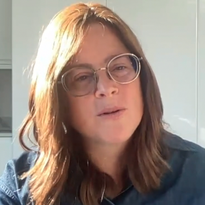Golda

Golda is 53 and lives with her husband and 3 children. She has a further 5 children who have left home. Ethnicity: Jewish American.
Golda caught Covid in December 2020 and she says around this time she had no idea what Long Covid meant as not a lot was known about it. Golda says that her Covid and Long Covid experiences has affected her “tremendously mentally.”. Golda was interviewed in November 2021.
More about me...
Golda caught Covid in December 2020 and she says around this time she had no idea what Long Covid meant as not a lot was known about it then. When Golda was discharged from hospital after her oxygen levels improved she was told to rest for 4- 6 weeks in bed at home.
Golda says she feels “very blessed” to have such a supportive family and community and says that around this time, she didn’t have to do a thing – “I literally did not have to leave my room and I didn’t.”
Golda says she was surprised when the GP called a couple of weeks later and asked if she wanted to be referred to the Long Covid clinic. She had thought that you had to have symptoms for 8 weeks to be considered as having Long Covid and remembers saying to the GP at the time, “Don’t curse me.”
Golda describes experiencing multiple infections over the subsequent 11 months and regularly needing antibiotics. She’s had singing and breathing therapy and has tried various alternative and complementary therapies with little success – “I just cannot encourage my breathing pattern to change.” Golda suffers from ‘brain fog’, fatigue, memory loss and heart palpitations and believes this is linked to her inability to take in enough oxygen. She also experiences gastric issues and swollen optic nerves.
Golda had to go back to A&E after about 6 weeks being back at home and says she “wasn’t mentally prepared” for the traumatic experience of returning to the same hospital and had a “full blown panic attack.”
Golda says her experience with Covid has had a big effect on her family. She says that “they had to come to terms with this mother who’s so active and so like able to do everything…” to someone who became so weak and sick and who couldn’t do the things she used to do like buying in food and cooking. Golda says that her Covid and Long Covid experiences has affected her “tremendously mentally” particularly as she’s not felt able to return to work.
Over time, Golda has managed to grow mentally stronger and she says that she credits this to her faith and also the supportive team of family and friends she has around her.
Golda appreciated a cardiologist being straightforward about not being able to have answers for her. She didn’t want doctors to make false promises in their efforts to be reassuring.
Golda appreciated a cardiologist being straightforward about not being able to have answers for her. She didn’t want doctors to make false promises in their efforts to be reassuring.
So, if I could tell the medical community one thing, it’s keep everything to your, to what you’re good at, don’t suddenly become an expert at something that you’re not an expert at and the other thing is, I saw cardiology two weeks ago and one thing that really impressed me with him was that he said, “Look,” he said, “this thing is two years old, we don’t know. You’re not gonna like what I’m gonna tell you but I can’t tell you. I don’t have answers for you.”
This is about my heart palpitations, and I actually turned to him, and I said, “Thank you so much, you’re the first doctor that is not telling me, most doctors say, ‘Look there is a solution’, I just, you know, ‘the good news there is a solution. The bad news is I can’t tell you when you’re gonna get better.’” Don’t tell me that. I don’t wanna hear that because guess what, how do you know there was a solution? Maybe I am gonna be like this the rest of my life. Don’t promise me something you don’t know.
Just because you’ve seen a million people get better from what I have, maybe I’m part of the other million that won’t actually get my lung capacity back or whatever it is. So, I said, to him, “Actually I’m really happy to hear what you have to say,” and he didn’t ask me about my mental health. First time, the first time I saw a doctor who didn’t say anything about my mental health.


